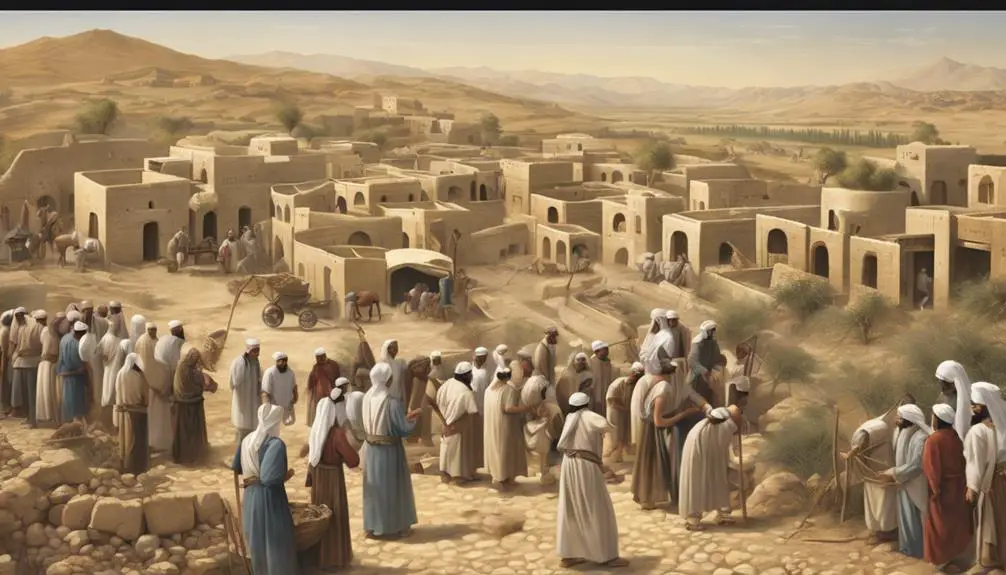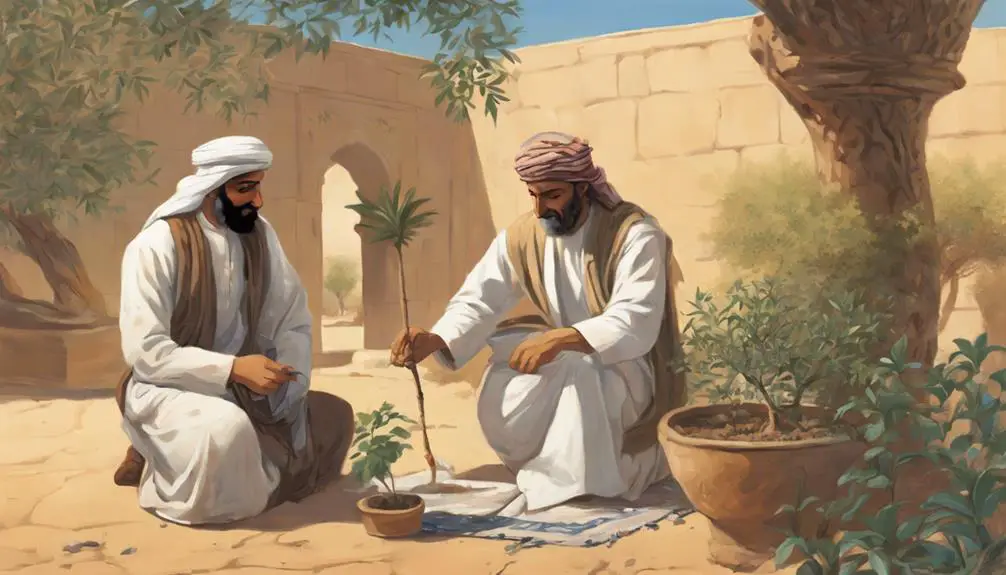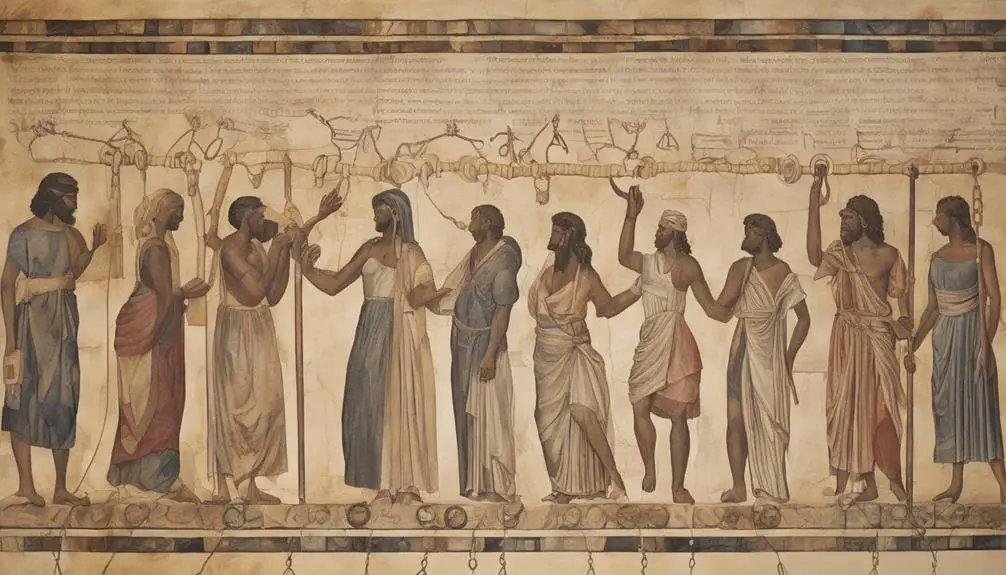Ponder the complexities of servitude in the Bible, where shades of gray challenge modern views and shape conversations on freedom.

Servitude in the Bible
As you navigate through the complex tapestry of servitude in the Bible, it's akin to unraveling a mystery that's been folded into history's pages.
You'll find that this topic isn't just black and white; it's interspersed with shades of gray where voluntary and involuntary servitude blur, and the rights and duties of servants are as varied as the sands on the shore.
Theological perspectives provide a deeper layer, challenging modern views and prompting a reevaluation of societal norms.
By exploring this further, you'll uncover how these ancient practices have shaped, and continue to influence, today's conversations on freedom and human dignity.
Key Takeaways
- Biblical servitude was shaped by legal, economic, and cultural landscapes of ancient societies.
- There were both voluntary and involuntary forms of servitude, each with distinct motivations and implications.
- Servants had specific rights and duties, with masters responsible for their fair and humane treatment.
- Theological perspectives on servitude often explore themes of justice, redemption, and divine-sanctioned social order.
Historical Context of Biblical Servitude

Understanding the historical context of servitude in the Bible is crucial, as it sheds light on the varied forms and functions of servitude across different periods and societies mentioned in the scriptures. You'll find that servitude was deeply embedded in the economic and social fabrics of these societies, often influenced by debt mechanisms and cultural norms.
Debt mechanisms played a pivotal role in the Biblical narrative of servitude. If you were unable to pay your debts, servitude was often the recourse to fulfill these obligations. This form of servitude wasn't only a reflection of economic hardship but also a structured approach within society to manage debt. Cultural norms, on the other hand, dictated the terms and conditions of this servitude, underscoring the societal acceptance and regulation of these practices.
These norms varied widely, showing that servitude wasn't a monolithic institution but a complex system shaped by the legal, economic, and cultural landscapes of the time. Understanding these dimensions helps you grasp the multifaceted nature of servitude in the Bible, beyond mere subjugation, highlighting its role within the societal and economic frameworks of ancient times.
Voluntary Vs. Involuntary Servitude
Building on the multifaceted nature of servitude in ancient societies, it's crucial to distinguish between voluntary and involuntary forms of servitude as outlined in biblical texts. Voluntary servitude often arose from debt repayment or family ties, positioning it as a socio-economic strategy rather than sheer subjugation. In contrast, involuntary servitude was typically a consequence of conquest or punishment, devoid of personal choice or familial obligation.
Type |
Cause |
Duration |
|---|---|---|
Voluntary |
Debt repayment |
Varied; until debt is cleared |
Voluntary |
Family ties |
Often temporary; could be lifelong |
Involuntary |
Conquest |
Indefinite; often lifelong |
Involuntary |
Punishment |
Specified by authority; could be lifelong |
Mixed |
Economic necessity |
Determined by circumstances |
This distinction is paramount in understanding the biblical perspective on servitude. Voluntary servitude allowed individuals a means to manage or escape economic hardship, with the possibility of regaining their freedom. Conversely, involuntary servitude symbolized a loss of autonomy, often with no clear path to freedom. Analyzing these forms sheds light on the complexity of servitude in biblical times, underscoring the importance of context in interpreting these ancient texts.
Rights and Duties of Servants

The biblical texts delineate specific rights and duties for servants, reflecting the societal norms and ethical standards of the time. These servant laws were integral to the fabric of ancient societies, ensuring a structured hierarchy yet affording protections and imposing obligations.
You'll find that the rights of servants encompassed basic provisions for food, shelter, and personal safety. These weren't merely benevolent gestures but mandated aspects of master responsibilities. It was understood that the well-being of servants was directly linked to their ability to fulfill their duties, which ranged from household chores to more specialized tasks depending on their skills and the needs of the household.
Moreover, the duties of servants were clearly outlined, emphasizing not only obedience and loyalty to their masters but also the expectation of diligence and integrity in their work. The reciprocal nature of these relationships was underscored by laws that held masters accountable for treating their servants with fairness and humanity. This framework sought to balance the power dynamics inherent in servitude, ensuring that while servants owed their labor and respect to their masters, they were also entitled to protection and care within this societal structure.
Theological Perspectives on Servitude
Exploring theological perspectives on servitude reveals how religious texts have shaped societal views on the roles and rights of servants throughout history. These texts often delve into the moral implications of servitude, offering redemption narratives that provide a deeper understanding of servitude's place in a moral and spiritual context.
- Moral Implications: You find that theological discourse frequently grapples with the ethical dimensions of servitude. It questions the justice and fairness of servitude, pushing you to consider the broader moral implications of subjugating individuals.
- Redemption Narratives: Religious texts are replete with stories of individuals in servitude finding redemption. These narratives aren't just tales of personal triumph; they symbolize the potential for societal transformation and the liberation from moral failings.
- Divine Justice: The concept of divine justice plays a crucial role in theological discussions on servitude, suggesting that ultimate judgment and rectification lie in the hands of a higher power.
- Social Order: Theological perspectives often frame servitude within the context of divine-sanctioned social order, challenging you to reconsider the relationship between divine will and social hierarchies.
In analyzing these elements, you gain insight into how theological interpretations of servitude have influenced not just religious thought but also societal structures and attitudes towards servitude.
Servitude's Influence on Modern Society

Throughout history, servitude's legacy has profoundly shaped modern societal structures and attitudes, influencing everything from labor laws to social hierarchies. You'll find its fingerprints on the economic impacts that linger in today's work environments and labor markets. These impacts aren't merely historical footnotes; they actively shape the way labor is valued and the dynamics between employers and employees. It's crucial to understand how past practices of servitude have paved the way for current labor laws, often striving to correct the inequalities and exploitations that were once commonplace.
Moreover, the cultural perpetuation of servitude's norms and values continues to influence social interactions and the stratification of society. You see its echoes in the persistent social hierarchies and in the subtle, sometimes overt, ways people are categorized and valued. This cultural legacy complicates efforts to achieve true equality and inclusivity, as it's woven into the fabric of societal norms and perceptions.
In analyzing servitude's influence on modern society, you're not just looking at historical remnants but at living influences that shape how societies function, how people interact, and how justice and equality are pursued and perceived.
Frequently Asked Questions
How Did Different Translations of the Bible Influence the Understanding of Servitude Across Various Cultures and Denominations?
You're exploring how different Bible translations have shaped interpretations of servitude across cultures and denominations. Translation accuracy plays a crucial role, as slight variations can significantly alter meanings, affecting cultural perceptions of servitude.
With each translation, scholars must navigate linguistic nuances and historical contexts, making it a complex task. Your analysis could reveal how these translations reinforce or challenge existing views on servitude within various communities.
In What Ways Did Biblical Servitude Differ From the Institution of Slavery in the Ancient Near East Outside of the Hebrew Context?
Imagine you're in ancient Mesopotamia, where servitude often lacks the concept of debt forgiveness seen in Biblical times.
Unlike the Hebrew context, where agricultural servitude allowed for periodic debt relief and eventual freedom, in the broader ancient Near East, such practices were rare.
You'd find that the lack of a structured system for debt forgiveness significantly distinguishes Biblical servitude from its contemporaries, emphasizing a more rigid and unforgiving form of labor outside the Hebrew influence.
How Have Contemporary Religious Leaders Across Different Faiths Interpreted and Applied Biblical Teachings on Servitude to Address Modern Social Justice Issues?
You're exploring how contemporary religious leaders interpret and apply ancient teachings to tackle modern social justice issues.
Clergy perspectives vary, but there's a notable trend towards using these teachings as a moral compass.
Through interfaith dialogue, leaders from different faiths share insights and strategies, aiming to address inequalities and injustices in society.
This approach not only enriches understanding across religions but also unifies them in their fight against contemporary forms of servitude.
Can Examples of Servitude in the Bible Be Compared to Any Forms of Modern-Day Employment Practices, and What Ethical Considerations Arise From Such Comparisons?
You're navigating a maze, where workplace autonomy is the cheese and ethical leadership the guiding hand.
Comparing modern-day employment practices to historical servitude highlights crucial ethical considerations. For example, does the lack of autonomy in some jobs mirror ancient servitudes?
It urges a reevaluation of leadership ethics, emphasizing the need for autonomy and respect in the workplace, akin to moving from a tightrope of control to a bridge of collaboration and freedom.
How Did the Concept of Servitude in the Bible Affect Gender Roles and Relationships Within Ancient Societies, and What Implications Does This Have for Gender Equality Discussions Today?
You're examining how ancient societal roles and relationships influenced gender equality debates today. This exploration underscores the impact of historical servitude on women's empowerment and societal evolution.
It's crucial to understand that these past dynamics shape current perceptions and discussions around gender roles. Analyzing this connection offers insights into the complexities of gender equality, highlighting how far we've come and the challenges that still persist in achieving true gender equality.
Conclusion
In conclusion, the tapestry of servitude woven through the biblical narrative highlights a complex interplay between societal norms and divine directives.
As you've explored, both voluntary and involuntary servitudes are threads of this fabric, each carrying its own set of rights and duties.
Theologically, these strands reflect varying interpretations of divinity's will.
In modern society, the legacy of biblical servitude casts long shadows, challenging us to untangle historical practices from contemporary ethical standards in our ongoing quest for justice and equity.



Sign up